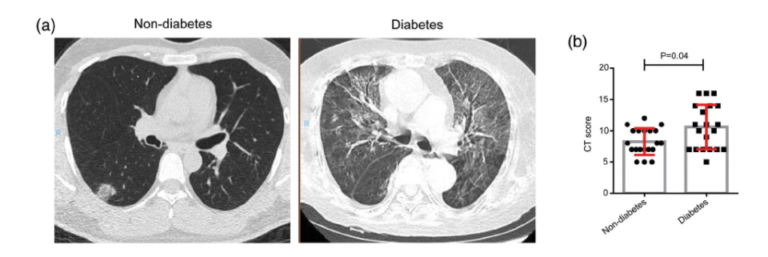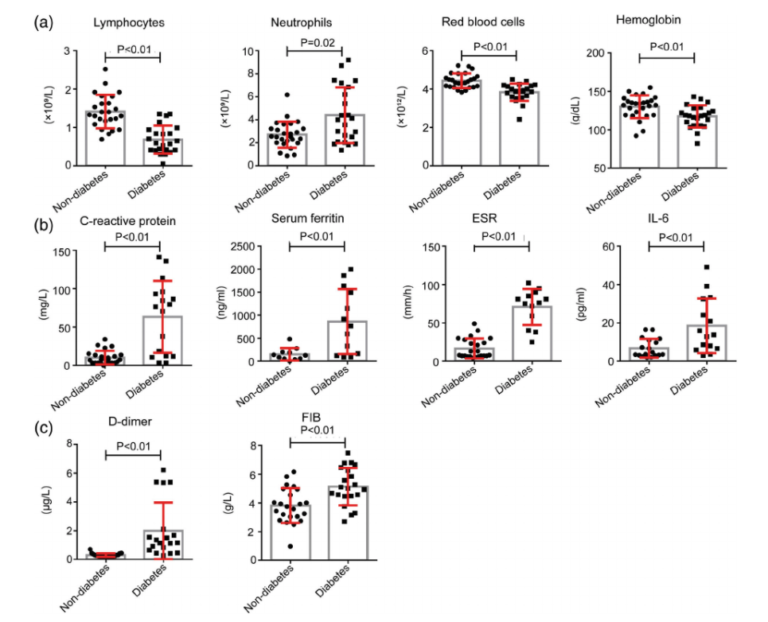Question: What are some of the mechanisms by which diabetes may increase risk of COVID morbidity and mortality?
Takeaway: Early evidence indicates the impact of diabetes on inflammation, immune function, and coagulability increases susceptibility to harm.
Diabetes has been a known risk factor for previous epidemic illnesses including pandemic influenza (1).
Previous research has linked this increased risk to the chronic inflammatory state and immune system imbalance associated with diabetes and other forms of poor metabolic health (2).
This March 2020 study compares the clinical status and prognosis of 37 diabetics to 137 nondiabetics among 174 Wuhan COVID patients. The average age of both nondiabetic and diabetic patients was similar (average of 58 and 61 years old, respectively).
As shown in the figure below, diabetic patients showed more advanced disease as assessed by CT imaging.

Figure 1: Diabetics display greater disease severity as assessed by CT scan.
Diabetics also showed elevated levels of lactic dehydrogenase (LDH), a-hydroxybutyrate dehydrogenase (HBDH), alanine aminotransferase (ALT), and y-glutamyltransferase (GGT) compared to nondiabetics, though these parameters were elevated relative to baseline in all subjects. Elevated LDH is a marker of myocardial damage; HBDH is a marker of kidney damage; ALT and GGT are markers of liver damage. The elevation of these markers across all subjects is consistent with the understanding that the SARS-CoV-2 virus causes multi-organ damage via binding to ACE2 receptors expressed across many organs. The increased levels of these parameters in diabetics indicates further susceptibility to multi-organ damage.
Diabetics also presented with reduced levels of leukocytes and elevated levels of IL-6, ferritin, and C-reactive protein relative to nondiabetics (who also showed less severe distortions in the same direction compared to healthy subjects). This pattern indicates diabetics may have increased risk of the “cytokine storm” that has been a cause of rapid deterioration and death in many COVID-19 patients and played a similar role with SARS and ebola (3). This deterioration may be further exacerbated by the elevated levels of fibrinogen and D-dimer seen in these diabetic patients, which may lead to a harmful hypercoagulable state. Notably, the fact that SARS-CoV-2 may directly infect (and so damage) the pancreas may trigger a vicious cycle, as was seen in SARS (4). This early evidence indicates diabetics infected with SARS-CoV-2 require a higher insulin dose to maintain glucose control, which may worsen the various distorted states noted above.

Figure 2: Diabetics show a variety of biomarker changes suggestive of elevated inflammation levels, impaired immune response, and increased vulnerability to a cytokine storm.
The authors conclude the apparent increase in disease severity seen in diabetics is at least in part due to an increased inflammatory response, impaired immune response, and increased susceptibility to multi-organ damage. They repeatedly note similar phenomena have been seen in previous disease pandemics, suggesting diabetes may increase risk for a number of severe diseases.
Notes
- Diabetes and infection — Is there a link?; Quantifying the risk of infectious diseases for people with diabetes; Increased risk of common infections for people with diabetes; Increased risk of common infections in patients with type 1 and type 2 diabetes; Infections in patients with diabetes mellitus; Immunological mechanisms contributing to the double burden of diabetes and intracellular bacterial infections; Plasma glucose levels and diabetes are independent predictors for mortality and morbidity in patients with SARS
- Cells of innate and adaptive immunity in type 2 diabetes and obesity; The immune system’s involvement in obesity-driven type 2 diabetes; Tissue resident macrophages: Key players in the pathogenesis of type 2 diabetes and its complications
- Binding of SARS to its receptor damages islets and causes acute diabetes; Clinical features of patients infected with 2019 novel coronavirus in Wuhan, China; Immunotherapeutic implications of IL-6 blockage for cytokine storm
- Ibid.
Comments on Diabetes Is a Risk Factor for the Progression and Prognosis of COVID‐19
How many canaries need to die before the miners realize there is a problem??
Diabetes Is a Risk Factor for the Progression and Prognosis of COVID‐19
1